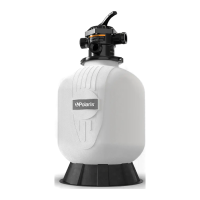ENGLISH
Polaris
®
Prestige Above Ground Sand Filter
|
Owner’s Manual
Page 8
• CLOSED: Closes all passages through the
Multiport Valve.
• WINTER: This valve position leaves the multiport
valve handle disengaged and all passages through
the valve open for draining. Once the lter is
drained, it is recommended that the valve handle
be kept in the Winter position. See winterization
instructions in section 5.6
• BACKWASH: Water passes through lter sand in
reverse and is sent to the waste port. With pump
running, periodically check water clarity in sight
glass. Once water is visibly clear, the backwash
cycle is complete.
• RINSE: Water passes through lter sand to waste.
Use after backwash cycle to clean debris from the
Multiport Valve. Rinse should run for 1-2 minutes.
5.2 Initial Start up
1. Make sure that all connections are secure and that
any glued piping connections or joints have had
sucient time to cure.
2. Backwash lter sand.
• Set multiport valve to backwash.
3. Turn on lter pump.
• Water will discharge from waste port.
• While pump is running, periodically check the
water clarity through the sight glass or at the
waste port.
• Once water is visibly clear the backwash cycle is
complete.
4. Turn o lter pump.
5. Set valve to rinse.
6. Stand clear of lter and turn on the lter pump.
• Water will discharge from waste port.
7. Allow lter to run for 1-2 minutes.
8. Turn o lter pump.
9. Set multiport valve to lter.
10. Stand clear of lter.
11. Turn on lter pump and allow it to run normally.
• Water will discharge to pool from return port.
• Take the pressure reading from the pressure
gauge while the lter pump is running at its
typical ltration RPM.
• Record the PSI on the pressure gauge, this is
the initial startup pressure and and the lter is
clean. A backwash is required when the pressure
consistently reads 10 PSI greater than the initial
startup pressure.
5.3 Operating Pressure
WARNING
X
MAXIMUM OPERATING
PRESSURE OF THE
FILTER IS 35 PSI.
NEVER SUBJECT THE
FILTER TO ANY OPER-
ATING PRESSURE
EXCEEDING 35 PSI
• Do not connect the system to an unregulated
city water system or other external source of
pressurized water producing pressures greater
than 35 PSI.
• This lter operates under high pressure. When
any part of the circulating system, i.e., lter,
pump, valve(s), etc. is serviced, air can enter
the system and become pressurized when the
system is restarted.
• Pressurized air in a system can cause product
failure or also cause the dial valve to be blown
o which can result in death, serious personal
injury or property damage.
• To minimize risk of severe injury or death, the
lter and/or pump should not be subjected to
the piping pressurization test. Local codes may
require the pool piping system to be subjected
to a pressure test. These requirements are
generally not intended to apply to the pool
equipment such as lters or pumps. Polaris pool
equipment is pressure tested at the factory.
If however, this WARNING cannot be followed and
pressure testing of the piping system must include
the lter and/or pump BE SURE TO COMPLY
WITH THE FOLLOWING SAFETY INSTRUC-
TIONS.
• Check all clamps, bolts, lids, lock rings and
system accessories to ensure they are properly
installed and secured before testing.
• RELEASE ALL AIR in the system before testing.
• Water pressure for test must NOT EXCEED
35 PSI
• Water temperature for test must NOT EXCEED
100°F (38°C).
• Limit test to 24 hours. After test, visually check
system to be sure it is ready for operation.
NOTE: These parameters apply only to Polaris
equipment. For non-Polaris equipment, consult the
equipment manufacturer.
The lter is designed to operate eectively based on the
performance curve listed below. At no time is the lter to
be subjected to internal pressures greater than 35 psi.

